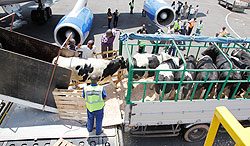The Irish government, through an Irish-based organisation, Bothar, yesterday donated 66 Friesian cows to the government to be distributed through the cattle stocking programme, Gir’inka. Bothar, which operates in Ireland and the United Kingdom, specialises in helping poor farmers in third world countries to become self-sufficient by offering them livestock.


The Irish government, through an Irish-based organisation, Bothar, yesterday donated 66 Friesian cows to the government to be distributed through the cattle stocking programme, Gir’inka.
Bothar, which operates in Ireland and the United Kingdom, specialises in helping poor farmers in third world countries to become self-sufficient by offering them livestock.
The Friesian cows, which each produces an average of 30 litres of milk per day, will be distributed to various families in Gasabo, Kayonza, Rulindo and Rwamagana districts.
Speaking to The New Times upon the arrival of the cows at Kigali International Airport, Bothar’s Regional Director, Dr Bernard Muyeya, said their mission is to continue assisting people fight poverty.
"Our government (Ireland) had the same problem after colonial rule…people suffered from famine and poverty, but we started receiving donations and later on people’s lives changed,” he said.
He added that they are making the donation in the same spirit.
Bothar began its operations in the country in 2006. Muyeya said that since then, about 800 cows and other domestic animals have been donated countrywide.
Prof. Shem Martin Ndabikunze, the Director General of Rwanda Agriculture Board (RAB), concurred noting that since the organisation launched its operations, many Rwandans had benefited.
"These people’s lives completely changed. Someone who used to earn Rwf 1000 in a week, now gets a lot of money through selling milk and other products from the cows,” Ndabikunze said.
He added that they plan to sign an MoU with Bothar to establish a veterinary institute that will help to educate and train nationals on livestock services.
RAB Deputy Director General in charge of Animal Resources, Dr Christine Kanyandekwe, said that they would provide veterinary officers to monitor the animals.
She added that the first off-spring of the cows would be passed on to other selected poor families.
Ends


